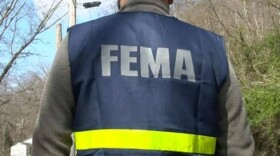Murder, manslaughter, addiction, prison, retribution, death: This week's handful of publishing highlights is indeed quite a handful — and an effective treatment for anyone suffering from too much sunshine and warmth and lightheartedness as we hurtle toward the summer solstice.
Paradoxically, sometimes all it takes to make your day a little brighter is to remind yourself just how dark life can get. These four novels and a true crime investigation are here to help with that.
Great Black Hope, by Rob Franklin
David Smith Jr. opens Franklin's debut novel in a seemingly enviable place: Young, Black and respectably wealthy, a Southerner so far ably navigating New York's stew of art openings and party drugs, our hero appears to be pretty comfortably insulated. But appearances are often deceiving. As Franklin ominously explained to NPR's Weekend Edition: "Generations of uphill climbing and upward mobility can essentially be undone in a single night for people in this kind of precarious race-class intersection."
King of Ashes, by S.A. Cosby
Cosby has needed just four novels and roughly half a decade to become what NPR reviewers have described as a "prince of the literary action thriller," whose every release promises "a literary event that demands our full attention." His latest Southern crime epic focuses on a crematorium and the troubled family that owns it. When one brother incurs a debt he can't pay, things begin to spiral violently out of control. Expect taut action catalyzed by themes Cosby has called the "four pillars of Southern fiction:" class, religion, sex and policing.
Murderland, by Caroline Fraser
Fraser's previous book, her 2017 biography of author Laura Ingalls Wilder, racked up an array of literary awards, including the Pulitzer Prize. This time around, the journalist has traded the prairie for the Pacific Northwest, and literary biography for true crime, as she investigates a rather more sanguinary subject: serial killers. Specifically, Fraser wants to know what accounted for their disproportionate prevalence in the region during the very years she grew up there, the 1970s and '80s. Fraser's research leads her past sensationalist headlines to an altogether more nebulous answer than you may expect, with farther reaching implications.
The River Is Waiting, by Wally Lamb
Lamb, a novelist best known for '90s book club stalwarts She's Come Undone and I Know This Much Is True, has returned with a truly soul-wrenching premise: A father of twins is to blame for a freak accident that shatters his family. Senseless, horrific, irreparable – and all his fault, even if he never intended it. But the novel is concerned less with the catastrophe itself, and more with how the reeling protagonist, Corby, faces the devastating fallout. After you have done something unforgivable, what comes next?
So Far Gone, by Jess Walter
Walter is not one for settling too long in a single style. The Washington state native has dabbled in mysteries, thrillers, domestic dramas and historical epics, often working in a variety of modes and genres at any given time. Still, for all these protean leaps, his sense of humor — a knack for finding the absurd clad in mundane clothing – tends to give him away. His latest focuses on a would-be recluse whose retreat into Walden-esque solitude is interrupted by a surprise visit from his grandchildren. Life, it turns out, has carried on in his absence, and he is going to have to reckon with the consequences of his attempt to escape it.
Copyright 2025 NPR









